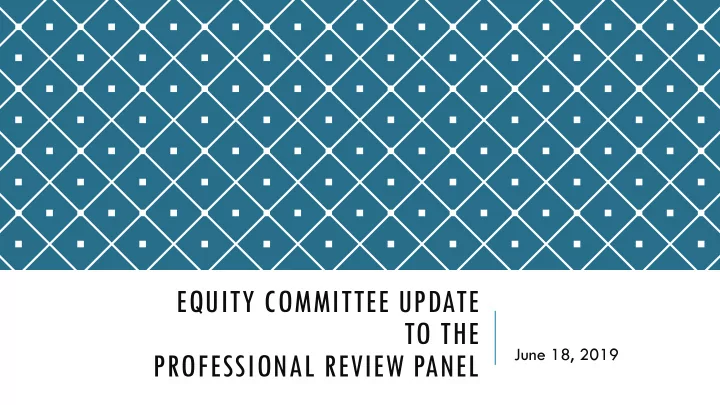

EQUITY COMMITTEE UPDATE TO THE June 18, 2019 PROFESSIONAL REVIEW PANEL
EQUITY COMMITTEE MEMBERS Bill Curtin, Educator, Carbondale Community High School William Davis, State Representative, 30 th District Dr. Nakia Hall, Board Member, Crete-Monee School District 201-U Jessica Handy, Government Affairs Director, Stand for Children Illinois Dr. Michelle Turner Mangan, Professor of Research, Concordia University Chicago (Chair) Ralph Martire, Executive Director, Center for Tax and Budget Accountability (Vice Chair) Brian Minsker, President, Illinois Parent Teacher Association Unique Morris, Multi-Tiered System of Supports Facilitator, Dolton District 148 2
ACKNOWLEDGEMENTS Amanda Elliott, Executive Director, Legislative Affairs, ISBE Dr. Bradley Hemenway, Principal Consultant, Data Strategies & Analytics, ISBE Barbara Hobrock, Legislative Affairs Coordinator, ISBE Patrick Payne, Director, Data Strategies & Analytics, ISBE Robert Wolfe, Chief Financial Officer, ISBE 3
EQUITY COMMITTEE CHARGE 1. Develop a shared understanding of the issue and purpose for studying equity as it relates to evidence-based funding (EBF). Review At-Risk Student Definition Review Adequate Funding for Poverty Concentration 2. Determine what information is needed to address equity in the elements, and distribution of EBF. 3. Determine if experts are needed to provide information on equity in EBF. 4. Develop options and formal recommendations for equity in EBF. 5. Present recommendations for equity in the EBF to the PRP. Our subcommittee work primarily focuses on equity issues surrounding race . 4
PURPOSE OF THE EQUITY COMMITTEE To make recommendations to the PRP regarding the elements and distribution of EBF that will address differences in student achievement and other student outcome measures among racial groups of K-12 public school students in Illinois. 5
EQUITY COMMITTEE GOAL Our goal is to remove systemic barriers to adequate and equitable school funding that contribute to the racial achievement gaps in Illinois K-12 public schools. 6
EQUITY COMMITTEE MEETINGS OVERVIEW April 10 th Debriefed from March PRP Meeting Discussed format of future statistical results for presentation – voted to include gender as comparison variable for discipline rates because that relationship is supported by research April 24 th Reviewed initial Recalibration Committee proposal with an equity lens May 8 th Reviewed final Recalibration Committee proposal with an equity lens Guest expert: Jamie Roundtree, Director of Teaching and Learning, Champaign Unit 4 Administrative Center – Gifted education discussion June 10 th Joined Annual Spending Plan Committee meeting to provide feedback using an equity lens 7
CHARGE 3: DETERMINE IF AN EXPERT IS NEEDED TO PROVIDE INFORMATION ON EQUITY IN EBF. Jamie Roundtree, Director of Teaching and Learning, Champaign Unit 4 Administrative Center Gaby Román, Center for Tax & Budget Accountability 8
EQUITY IMPACT STATEMENT ON RECALIBRATION PROPOSAL Gifted Education • Accessibility to gifted education is an equity concern from both an identification standpoint, as well as access to curricula. • Though high schools may not be capturing funds for their AP courses in this category, we support keeping it at one per pupil amount (as opposed to breaking it down by Elem/Mid/HS) so that rural areas with less access may be able to expand their offerings. Instructional Materials • It is highly likely that there is a higher need for instructional materials dollars in schools serving students from low-income families. We would be able to confirm this through the Annual Spend Plan’s collection of FTEs. All of these elements are predicated on if they have a foundation; because of hold harmless, there are built-in inequities we need to be mindful of. Assessments • No equity concerns raised. 9
EQUITY IMPACT STATEMENT ON RECALIBRATION PROPOSAL Student Activities • Low-income districts often charge higher fees for students to participate in activities due to lack of overall funds. Suggest constructing a map of accessibility as to who can afford student activities and who cannot. Lack of funding in this area could affect drop-out rates for students who need these activities to stay engaged. Maintenance & Operations • No equity issues raised. Only data outliers needed explanation. Central Office • Breaking down this category further so family engagement and technology are separated out would help to discern where inequities lie. 10
EQUITY IMPACT STATEMENT ON ANNUAL SPEND PLAN PROPOSAL ISBE changed data collection from aligning with each EBF Element to only some & changed from FTEs to Dollar Amounts • Oppose these two changes as they prevent meaningful equity analyses at both district and state levels. • Dollar totals do not provide context like FTEs can. Dollar totals do not measure what they are being spent on -- for example, how spending on English Learners compares proportionally to the student demographic needs in that district. • This is a barrier to transparency. • Without FTE data, you cannot tell how the model is being implemented. • There is a disconnect from what data is needed for the evaluative study & what was already approved at the March PRP meeting. • Intra-district school comparisons are not meaningful without FTEs. ISBE added elements for family & community engagement; early childhood • Support those additional elements as they are important to supporting equity and adequacy efforts. 11
NEXT STEPS Continue to review PRP committees’ recommendations with equity lens Gather current literature on equity 12
Recommend
More recommend